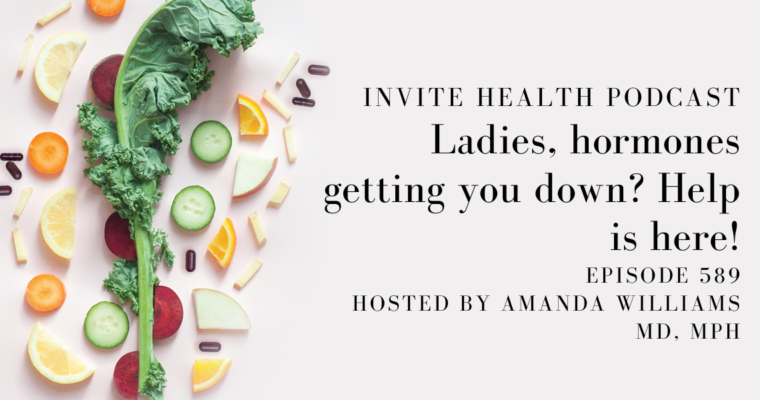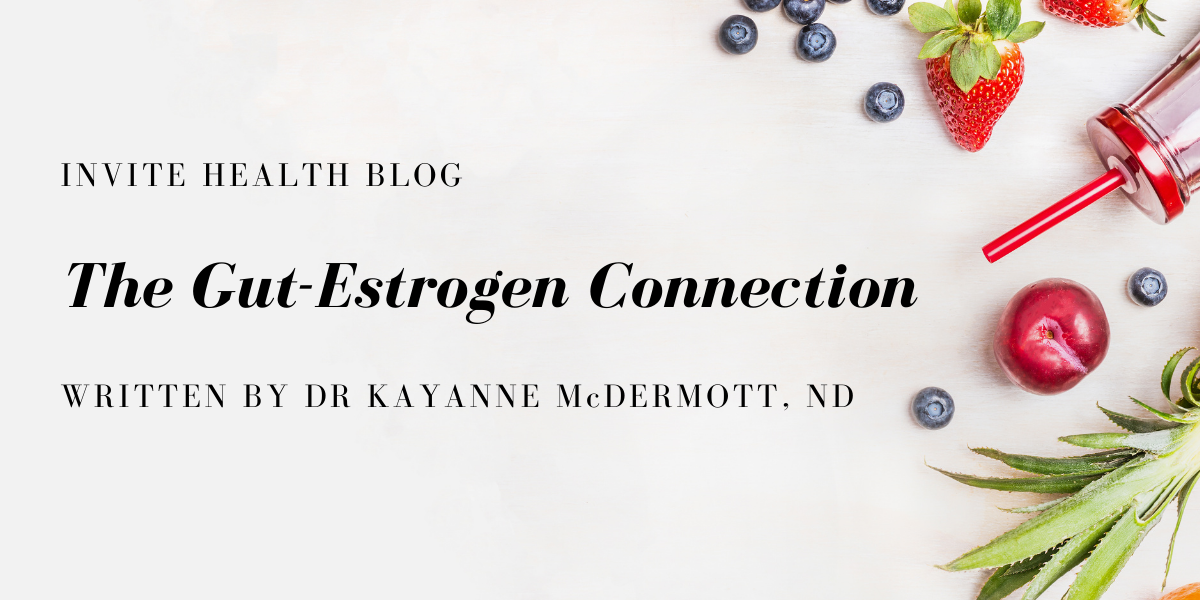Written by Dr. Kayanne McDermott, ND estrogen
For further questions or concerns email me at kmcdermott@invitehealth.com†

Have you ever been to a party or event and someone asks how you’re feeling? What you want to say is you’re bloated, tired, can’t think straight, and constipated but you say,” I’m well, how are you?” The symptoms I’ve listed are for Gut dysbiosis or Intestinal Dysbiosis, an imbalanced gut flora. (1) Gut dysbiosis changes the composition of the community of organisms in your digestive system relative to the microbiome found in a healthy individual. I always say, it all starts in the gut. Think of your gut as the roots and the rest of your body, the tree. In order for a tree or plant to get its nutrients and hydration, the roots have to be watered and fertilized, not the limbs, or the leaves. The balance of your gut flora or gut microbiome, affects your health in more ways than one. Bloating, gas, loose stools, constipation, fatigue, anxiety, depression, period pain, premenstrual syndrome (PMS), recurrent vaginal infections, acne, bladder infections, and so much more. Today, I’m going to talk a little bit about the connection between the gut microbiome and estrogen production.†
Estrogen
The gut microbiome regulates estrogens through the secretion of B-glucuronidase, an enzyme that breaks down estrogen into their active forms. (2) When there’s an imbalance of the gut flora, an excess of bad bacteria floating around in the gut, estrogen can regress into divided forms, reabsorbing back into the bloodstream. This results in Estrogen Dominance or an excess of estrogen, common among women and men. Estrogen dominance has been associated with conditions such as breast & uterine cancers, fibroids, endometriosis, benign prostate hyperplasia, & polycystic ovarian syndrome. Symptoms may include, but not limited to, mood swings, irritability, depression, weight gain, trouble sleeping, hair loss, irregular menses, low libido, low energy, and brain fog.†
A balanced, healthy gut consists of abundant & diversified ecosystem of billions and trillions of bacteria, fungi, and other microorganisms. This can support a healthy, hormone balance. Balancing your hormones, is to balance your gut microbiome. (3) Eat more plants, especially cruciferous vegetables, fruits, fermented foods and whole grains to increase your fiber consumption. This feeds the good bacteria, supports the breakdown and excretion of estrogen as well as estrogen metabolism.†
WHAT THE HECK IS A HORMONE? – INVITE HEALTH PODCAST, EPISODE 541>>Listen Now!
Studies have shown flax seed may support hormone imbalance due to the high concentration of lignans and fiber. (4) Invite’s Organic Flaxseed Powder or
High Lignan Flaxseed Capsules can be beneficial in supporting the recycling and balancing of the estrogen pathways.†
As you work on supporting your hormones and balancing your gut bacteria, indoles and sulphorphane found in cruciferous vegetables may support the liver’s metabolism of estrogen, and providing indirect antioxidant support for hormone-sensitive tissues. (5) It’s impossible to get the necessary amount required through eating cruciferous vegetables, such as broccoli, cabbage, brussel sprouts, and cauliflower alone. Implement Invite’s Indole-3-Carbinol with DIM to enhance the process of the gut-hormone balance.†
B vitamins especially Vitamins B6, B12 & Folate play huge roles in balancing hormones. Estrogen metabolism weighs heavily on these vitamins especially due to their significant role in the process. For example, Vitamin B6 participates in making progesterone. You can add Invite’s Methyl B to your daily supplement routine, if you’re experiencing estrogen dominance.†
It’s necessary for excess estrogen to be cycled out of the body through good liver metabolism and having a healthy and balanced gut flora. Remember when I mentioned that an overgrowth of bacteria creates an enzyme causing estrogen to be recycled back into your bloodstream instead of through your stool or urine? In addition to eating fermented foods such as Kimchi, sauerkraut, organic kefir, organic kombucha to support a healthy gut microbiome, adding Invite’s Probiotic Hx and Probiotic Hx Women, a probiotic made specifically for women’s needs, would support you by decreasing the activity of beta-glucaronidase. A majority of us do not include fermented foods in our daily diet due to limited time and resources. Supplementing daily with Probiotics are essential. †
Probiotics are live bacteria that not only help support a healthy gut microbiome but may lower inflammation in the gut. There are ongoing studies on how probiotics impact the gut microbiome. Using probiotics could provide support in fertility, urinary tract & vaginal infections, reducing anxiety & depression, premenstrual syndrome (PMS), better sleep, clearing of bloating, constipation & IBS,(inflammatory bowel syndrome), as well as improved weight loss. (6) When there’s inflammation in the gut, estrogen metabolism can be impacted significantly.†
If you suspect that you may be experiencing estrogen dominance, speak with your Gynecologist as well as an Invite Health degreed healthcare professional who can work together to support you on your hormone balancing journey.†
References
(1) José E Belizário, Joel Faintuch. (2012). Microbiome and Gut Dysbiosis. PMID: 30535609
DOI: 10.1007/978-3-319-74932-7_13
(2))James M Baker, Layla Al-Nakkash, Melissa M Herbst-Kralovetz. (Epub, Jun 23, 2017.) “Estrogen-gut microbiome axis: Physiological and clinical implications.” Mauritas. 2017 Sep;103:45-53. doi: 10.1016/j.maturitas.2017.06.025.
(3) José E Belizário, Joel Faintuch. (2012). Microbiome and Gut Dysbiosis. PMID: 30535609
DOI: 10.1007/978-3-319-74932-7_13
(4)W R Phipps, M C Martini, J W Lampe, J L Slavin, M S Kurzer. (November 1, 1993). “The Effect of flax seed Ingestion on the Menstrual cycle.” The Journal of Clinical Endocrinology & Metabolism, Volume 77, Issue 5. Pages 1215-1219.
(5)Karen J Auborn , Saijun Fan, Eliot M Rosen, Leslie Goodwin, Alamelu Chandraskaren, David E Williams, DaZhi Chen, Timothy H Carter. ” (2003 Jul). Indole-3-carbinol is a negative regulator of estrogen.” The Journal of Nutrition.
(6) Romm, Aviva MD. (2021). “Hormone Intelligence: the complete guide to calming hormone chaos and restoring your body’s natural blueprint for well-being.” First Edition. San Francisco.
Maryann Kwa, Claudia S Plottel, Martin J Blaser, Sylvia Adams. (April 22, 2016). “The Intestinal Microbiome and Estrogen Receptor-Positive Female Breast Cancer.” The Journal of National Cancer Institute.





